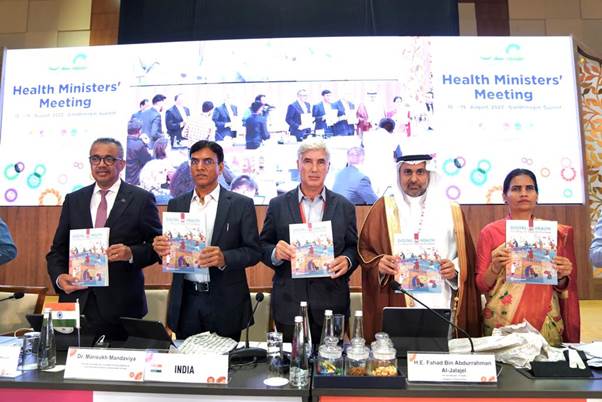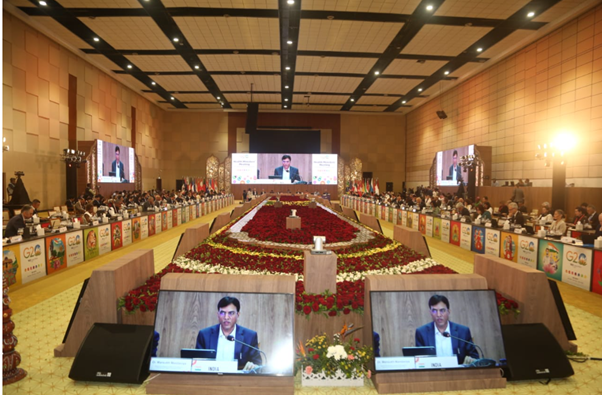
Gandhinagar: The World Health Organization (WHO) and the G20 India presidency announced a new Global Initiative on Digital Health (GIDH) today at the Health Minister’s Meeting of the G20 Summit hosted by the Government of India here today.
Speaking at the launch, India’s Union Health Minister Dr Mansukh Mandaviya said, “Today was a momentous day in the history of the G20 Health Working Group, wherein G20 countries not only identified a priority for its relevance but collectively worked towards its launch.” The new Global Initiative on Digital Health is one of the key deliverables of India’s G20 Presidency.
The new GIDH initiative (pronounced “guide” for short) will operate as a WHO-managed network and platform to support the implementation of the Global Strategy on Digital Health 2020–2025. WHO serves as the Secretariat for the strategy implementation to converge and convene global standards, best practices and resources to fast-track digital health system transformation.
“We thank the G20 countries and the India G20 Presidency for recognizing WHO’s unique role and strengths in this area and supporting the establishment of the new GIDH network,” said Dr Tedros Adhanom Ghebreyesus, WHO Director-General. “Continued support and collaboration of the G20, development partners and international organizations will be necessary to accomplish together what none of us can do alone. WHO is committed to working with countries to strengthen their capacities and to improve access to quality-assured digital solutions for a healthier, safer, fairer future.”

Since the first WHO resolution on eHealth in 2005 that led the pathway for the development and adoption of the WHO Global Strategy on Digital Health, over 120 WHO Member States have developed a national digital health policy or strategy.
While recent experiences during the COVID-19 pandemic resulted in a boost in digital health use, many countries express the need for support to move from product-focused and pilot digital health initiatives to establishing national digital health infrastructure with appropriate governance, policy and a competent health workforce needed to select, maintain and adapt digital health interventions.
The GIDH initiative aims to bring countries and partners together to achieve measurable outcomes by:
- developing clear priority-driven investment plans for digital health transformation;
- improving reporting and transparency of digital health resources;
- facilitating knowledge exchange and collaboration across regions and countries to accelerate progress;
- supporting whole-of-government approaches for digital health governance in countries; and
- increasing technical and financial support to implement the Global Strategy on Digital Health 2020–2025 and its next phase.
WHO and its partners announced substantial commitments in cash and kind from multiple stakeholders to support the launch of this new Initiative.
Digital health is a proven accelerator to advance health outcomes towards achieving Universal Health Coverage and health-related Sustainable Development Goals by 2030. Digital health interventions improve health care in many ways, from supporting individuals in managing their health and wellness journeys to enabling care providers to adhere to guidelines and provide high-quality care, to strengthening health systems by improving supply chains and workforce management.
During the meeting, a World Bank Report titled Digital-in-Health: Unlocking the Value for Everyone, was also launched today. It presents a new way of thinking from simple digitization of health data to fully integrating digital technology in health systems. It focuses on infusing digital technologies into health financing, service delivery, diagnostics, medical education, pandemic preparedness, climate and health efforts, nutrition, and ageing.
The first Joint Finance and Health Ministerial was chaired by Nirmala Sitharaman, the Union Finance Minister, and Dr Mandaviya. In the course of discussions in the Meeting, the Finance and Health Ministers expressed their commitment to continue strengthening the global health architecture for pandemic prevention, preparedness and response (PPR) through enhanced collaboration between Finance and Health Ministries under the Joint Finance and Health Task Force (JFHTF). At the Task Force meeting, India’s Union Health Minister Dr Mansukh Mandaviya announced the First Call for proposals by the Pandemic Fund. He further said, “It’s worth noting that more than 75% of the projects, that will receive support from this initial Call are located within LICs/LMICs [Low-Income Countries/Low-or Middle-Income Countries] Countries. He further acknowledged the need for Day Zero Financing as a crucial lesson for future health crises. In this regard, he said, “There is a need to converge the ongoing efforts to build a mechanism, to address this issue in G20 and G7 along with WHO and the World Bank. Sustaining this collaboration beyond the emergency phase and exploring various coordination arrangements will aid G20 countries and the wider international community in developing critical strategies and approaches, for finance and health institutional coordination.”
At the meeting India’s Finance Minister Nirmala Sitharaman said, “The Task Force under Indian Presidency has adopted a multi-year work plan for the first time and has also invited selected key regional organizations, thereby enhancing the voice of low-income countries.” The Ministers welcomed the outputs delivered by the JFHTF during the course of the Indian Presidency which include the following:
- The Framework for Economic Vulnerabilities and Risks (FEVR) created through collaboration between World Health Organization, World Bank, IMF, and European Investment Bank.
- The Report on Mapping Pandemic Response Financing Options and Gaps developed by the WHO and the World Bank.
- The Report on Best Practices on Finance Health Institutional Arrangements during Covid-19.
– global bihari bureau




